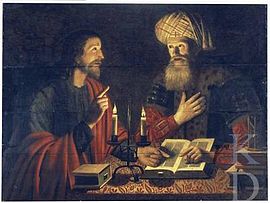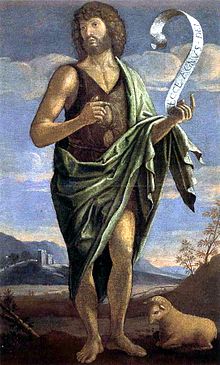Bible: What Does John 3 Teach Us About Nicodemus and the New Birth?
The Apostle John

Jesus and Nicodemus

Nicodemus Visits Jesus at Night
The Apostle John relates an extraordinarily telling account about the visit of a member of the Jewish leadership—the Pharisee Nicodemus—with Jesus (vv. 1-21).
Afraid of probable repercussions from his fellow religious, this ruler stops by to see the Lord at night.
He addresses Jesus respectfully (“Rabbi”); his subsequent words imply that he may be functioning as a factional representative sent to inquire of the new “teacher come from God.”
This party “knows” that Jesus’ “signs” demonstrate that God is empowering Him (v. 2).
[Does doing “signs,” therefore, necessarily indicate one’s status as the Messiah, or does it only show that God was enabling one to perform miracles?]
Jesus flawlessly cuts through Nicodemus’ flattering introduction, and zeroes in on humanity’s eternal need by using His first “Most assuredly” assertion in this encounter: individuals must be “born from above” in order to “see” the kingdom of God (v. 3).
[What connection, if any, does the Lord’s response here have to do Nicodemus’ reference to doing signs through God’s enablement?
Could it be that Jesus is saying, “I am able to do these signs because I am uniquely born of God”?
What does it mean to “see” the kingdom? Is “seeing”a figure of speech meaning spiritual apprehension, or is it to be taken normally as just a physical sense?]
Nicodemus, amazingly (but predictably) unable to comprehend spiritual truth, takes Jesus’ statement to mean another physical birth (v. 4).
[Probably the most astounding fact to ponder is that many contemporary biblical scholars cannot understand spiritual truth; their unbelief has spiritually blinded their eyes.
Even Jesus expresses amazement (or perhaps dismay) when He remarks that Nicodemus, “the teacher of Israel,” does not “know these things” (v. 10).]
Prerequisite to Enter the Kingdom
view quiz statisticsTo explain what “born from above”/”born again” means, Christ launches into a lengthy discourse (vv. 5-8, 10-21) that Nicodemus interrupts only once with his incredulous “How can these things be?” (v. 9).
Jesus’ answer, which He introduces with a second “Most assuredly,” sets down the one prerequisite for entrance into God’s kingdom, not for the ability to “see” it (v. 5; cf. v. 3).
[With the change in verb, does Jesus intend a difference in meaning?]
Being “born again” means being “born of water and the Spirit” (v. 5a). Jesus identifies being “born of water” with being “born of the flesh,” i.e., a physical birth.
He distinguishes this birth from the spiritual birth by the Spirit (v. 6).
Thus, experiencing both births in order to enter God’s kingdom may be the interpretation of this puzzling phrase.
[Others have suggested that the "water" is the word of God.]
Nicodemus must have expressed quizzical surprise at Him, for Jesus sees the necessity to tell him
(1) not to marvel at what He is saying, and
(2) what His original requirement for kingdom citizenship is (again) [v. 7].
People in whom the Spirit has wrought a second birth experience a sovereign, secret operation on their spirit.
Just as the wind works mysteriously in the natural world, so the Spirit works in the spiritual (v. 8).
Nicodemus’ query (v. 9) leads Jesus to rebuke him for his spiritual ignorance (v. 10), and then to discourse on the necessity of placing faith in Him (vv. 11-21).
Christ tells this Jewish leader that We have testified to him about what We know and what We have seen, but the latter has not accepted Our witness (v. 11).
[This plural pronoun probably means Jesus and His Father (cf. 5:37).]
Nicodemus is unwilling to understand spiritual things because he cannot see how the material realities that Jesus has shared with him relate to the spiritual (v. 12).
Nevertheless, Christ proceeds to relate to Nicodemus a list of great spiritual truths:
(1) He, the Son of Man, is the only Person not only to descend from and to ascend into heaven, but also to exist in both places simultaneously; the Nestle version does not include the last relative clause in verse thirteen;
(2) He, the Son of Man, will “be lifted up,” as was the brazen wilderness serpent in Moses’ time; Jesus compares His crucifixion and belief in Him as the antidotes to eternal death with the “lifting up” of the nehushtan and the Israelites’ “looking” upon it to heal them of their poisoning (vv. 14-15; cf. Num. 21:5-9);
(3) He is the only-begotten (unique; one of a kind) Son of God whom God (the Father) gave to the world of men as a gift, so that individuals who put their faith in Him (the Son) might receive everlasting life, the very life of God (v. 16);
(4) God’s purpose for the Son’s missionary journey centers on saving people out of the world, not on condemning everyone (v. 17);
(5) Individuals resident in this world system who nevertheless put their trust in the “name [Person] of the only-begotten Son of God” escape condemnation; those who do not trust in Him exist already in the state of condemnation along with the whole world system.
God saves a believing remnant out of this massa perditionis (mass of perdition) [v. 18];
(6) This condemnation results from the evil deeds of the “darkness-loving” segment of mankind that, unlike that other part of humanity that (by God's grace) desires to exalt the Lord’s power in its righteous works and thus comes to the light, rejects divine revelation (light) and avoids its exposing rays (vv. 19-21).
Thus ends Jesus’ discourse with Nicodemus as John the apostle recorded it; the Jewish leader makes no reply to its message, but the truths Jesus speaks to him most certainly contribute to his salvation later.
John the Baptizer

From Galilee, Jesus enters Judea with His disciples, and carries on a baptizing ministry there (v. 22).
[John 4:2 records that Jesus delegated this immersion responsibility to His men.]
Before his arrest, John continues to baptize "up the road" in the Samarian town of Aenon near Salim, a place of abundant water (vv. 23-24).
[This latter observation strongly suggests that John’s mode of baptism was immersion.]
Meanwhile, an issue of purification arises between John’s disciples and certain “Jews”; since the problem somehow involves Jesus’ blossoming ministry (which John’s men perceive with jealousy), the latter approach their leader seeking answers (vv. 25-26).
[Perhaps the issue raises the question, “Which man’s ministry has the real authority?”]
John’s reply expresses the same thought that Jesus’ words to Pilate would convey at His trial: all earthly authority comes from God (v. 27; cf. 19:11).
The Baptizer clearly represents himself as a subordinate to Christ in several ways:
(1) He is the one “sent before Him,” (v. 28).
(2) He is the “friend of the bridegroom,” not the bridegroom Himself (v. 29).
(3) He, as Christ's forerunner, must decrease, while Jesus must increase (v. 30).
(4) He originated on earth and speaks about temporal matters; Christ’s place is heavenly, and He is the sovereign, transcendent One (v. 31).
The Believer's Present Possession
view quiz statisticsA substantial part of the rest of John’s testimony regarding Christ sounds more like his Master than it does him.
For instance, John uses almost the same words Jesus employed earlier to communicate the same truth: none among the leadership has received the Lord's witness (v. 32; cf. 3:11).
His next words, however, resemble his own diction: John has received Jesus’ testimony, and he avers that “God is true.”
That is, John believes that God has provided evidence that He has sent Jesus, because Christ “speaks the words of God” under the complete control of the Spirit of God (vv. 33-34a).
John’s last two verses revert to the same speech pattern as that of Jesus, and they express four outstanding truths:
(1) The Father loves the Son (v. 35a);
(2) The Father has given the Son absolute authority over the universe (v. 35b);
(3) Believers in the Son have eternal life (v. 36a; cf. 3:16);
(4) Unbelievers abide under the wrath of God, and they shall not “see” life (v. 36b; cf. 3:18).
© 2014 glynch1



